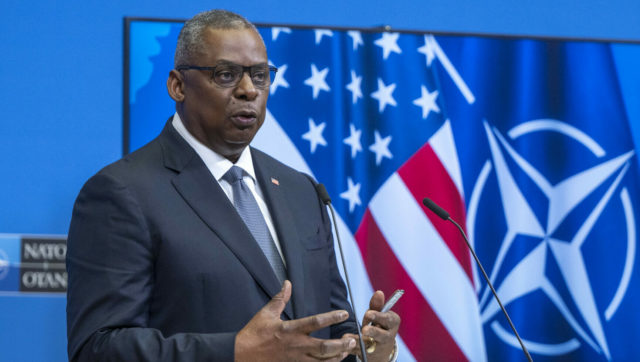
Russia’s losses in Ukraine should deter it from aggression elsewhere, US says Secretary of Defense Lloyd J. Austin III at the NATO defense ministerial at NATO headquarters in Brussels, Belgium, Oct. 22, 2021. (DoD photo by Chad J. McNeeley)
This article was originally published by Radio Free Europe/Radio Liberty and is reprinted with permission.
U.S. Defense Secretary Lloyd Austin has expressed hope that Russian losses in Ukraine will prevent the Kremlin from repeating its aggression elsewhere, as Russian forces pressed ahead with their attacks in the east.
Austin, speaking after he and U.S. Secretary of State Antony Blinken visited Ukraine, told reporters that Washington wants to see “Russia weakened to the degree that it can’t do the kinds of things that it has done in invading Ukraine,” adding that Kyiv can still win the war if given the right support.
Austin and Blinken’s visit, during which they announced an extra $700 million in military aid to Ukraine and other allies, marked the highest-level trip to Ukraine by U.S. officials since the invasion began over two months ago.
The United States has sent some $4 billion in military aid since President Joe Biden’s term began last year, and already announced last week a new $800 million aid package.
In eastern Ukraine, the city of Kreminna, in the Luhansk region, has fallen to the Russians, the British Defense Ministry said on Twitter on April 26.
Street-to-street fighting had been going on for days in Kreminna, with civilian evacuations there made impossible by the war.
The British report said heavy fighting was under way in the south of the city of Izyum, as Russian forces try to advance toward the cities of Slovyansk and Kramatorsk in the Donetsk region.
“Ukrainian forces have been preparing defenses in Zaporizhzhya in preparation for a potential Russian attack from the south,” it added in the regular bulletin, also saying that Russian troops were likely to attempt to encircle heavily fortified Ukrainian positions in the east.
On the diplomatic front, UN Secretary-General Antonio Guterres is scheduled to meet Russian President Vladimir Putin in Moscow later on April 26, but expectations from the meeting are reported to be low after several rounds of failed diplomatic efforts.
The meeting will come after Russian Foreign Minister Sergei Lavrov said late on April 25 that Western arms shipments to Ukraine meant that NATO is essentially engaging in war with Russia through a proxy and arming that proxy, and weapons delivered to Ukraine from the West will be “legitimate targets” for the Russian military.
Lavrov also warned of the threat of a third world war and there is a “considerable” risk of the conflict escalating to nuclear weapons.
“The danger is serious, it is real, it must not be underestimated,” Lavrov said.
But Ukrainian Foreign Minister Dmytro Kuleba said Lavrov’s comments were meant to just “scare the world off supporting Ukraine.”
Earlier, Russia’s ambassador in Washington told the United States to halt arms shipments, warning that large Western deliveries of weapons were inflaming the conflict.
Ukraine’s Defense Ministry said Russia continued to attack the Azovstal plant in the besieged port of Mariupol on April 25 despite Russian claims that it had established a humanitarian corridor to allow civilians to leave the city.
Deputy Prime Minister Iryna Vereshchuk said the humanitarian did not materialize.
She also asked UN’s Gutteres to “initiate and guarantee” a corridor for civilians to escape the Azovstal complex with representatives of the United Nations and the Red Cross present.
Shortly after she made her comments, an aide to President Volodymyr Zelenskiy said Russian forces were attacking the steel plant.
The sprawling steel complex has remained the last bulwark of Ukrainian resistance in the strategic Sea of Azov port city.
Ukrainian officials say that up to 1,000 civilians are sheltering in the maze of underground tunnels there. They have repeatedly urged Russia to offer them a safe exit, but previous attempts at organizing evacuations have failed.




